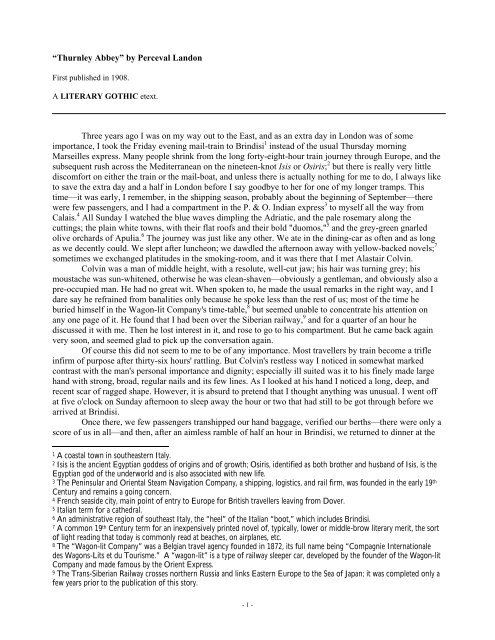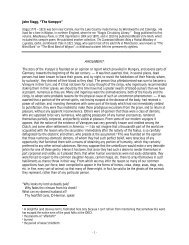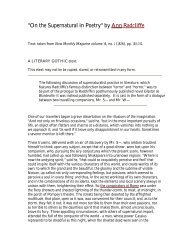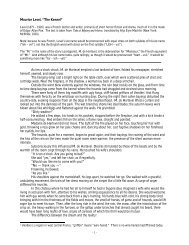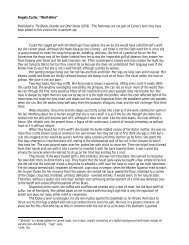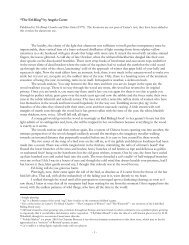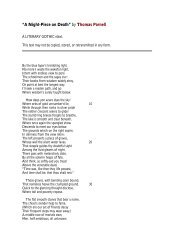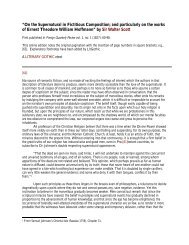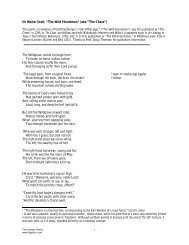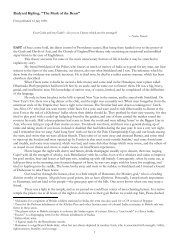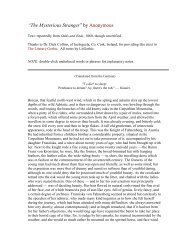“Thurnley Abbey” by Perceval Landon - The Literary Gothic
“Thurnley Abbey” by Perceval Landon - The Literary Gothic
“Thurnley Abbey” by Perceval Landon - The Literary Gothic
Create successful ePaper yourself
Turn your PDF publications into a flip-book with our unique Google optimized e-Paper software.
<strong>“Thurnley</strong> <strong>Abbey”</strong> <strong>by</strong> <strong>Perceval</strong> <strong>Landon</strong><br />
First published in 1908.<br />
A LITERARY GOTHIC etext.<br />
Three years ago I was on my way out to the East, and as an extra day in London was of some<br />
importance, I took the Friday evening mail-train to Brindisi 1 instead of the usual Thursday morning<br />
Marseilles express. Many people shrink from the long forty-eight-hour train journey through Europe, and the<br />
subsequent rush across the Mediterranean on the nineteen-knot Isis or Osiris; 2 but there is really very little<br />
discomfort on either the train or the mail-boat, and unless there is actually nothing for me to do, I always like<br />
to save the extra day and a half in London before I say good<strong>by</strong>e to her for one of my longer tramps. This<br />
time—it was early, I remember, in the shipping season, probably about the beginning of September—there<br />
were few passengers, and I had a compartment in the P. & O. Indian express 3 to myself all the way from<br />
Calais. 4 All Sunday I watched the blue waves dimpling the Adriatic, and the pale rosemary along the<br />
cuttings; the plain white towns, with their flat roofs and their bold "duomos," 5 and the grey-green gnarled<br />
olive orchards of Apulia. 6 <strong>The</strong> journey was just like any other. We ate in the dining-car as often and as long<br />
as we decently could. We slept after luncheon; we dawdled the afternoon away with yellow-backed novels; 7<br />
sometimes we exchanged platitudes in the smoking-room, and it was there that I met Alastair Colvin.<br />
Colvin was a man of middle height, with a resolute, well-cut jaw; his hair was turning grey; his<br />
moustache was sun-whitened, otherwise he was clean-shaven—obviously a gentleman, and obviously also a<br />
pre-occupied man. He had no great wit. When spoken to, he made the usual remarks in the right way, and I<br />
dare say he refrained from banalities only because he spoke less than the rest of us; most of the time he<br />
buried himself in the Wagon-lit Company's time-table, 8 but seemed unable to concentrate his attention on<br />
any one page of it. He found that I had been over the Siberian railway, 9 and for a quarter of an hour he<br />
discussed it with me. <strong>The</strong>n he lost interest in it, and rose to go to his compartment. But he came back again<br />
very soon, and seemed glad to pick up the conversation again.<br />
Of course this did not seem to me to be of any importance. Most travellers <strong>by</strong> train become a trifle<br />
infirm of purpose after thirty-six hours' rattling. But Colvin's restless way I noticed in somewhat marked<br />
contrast with the man's personal importance and dignity; especially ill suited was it to his finely made large<br />
hand with strong, broad, regular nails and its few lines. As I looked at his hand I noticed a long, deep, and<br />
recent scar of ragged shape. However, it is absurd to pretend that I thought anything was unusual. I went off<br />
at five o'clock on Sunday afternoon to sleep away the hour or two that had still to be got through before we<br />
arrived at Brindisi.<br />
Once there, we few passengers transhipped our hand baggage, verified our berths—there were only a<br />
score of us in all—and then, after an aimless ramble of half an hour in Brindisi, we returned to dinner at the<br />
1 A coastal town in southeastern Italy.<br />
2 Isis is the ancient Egyptian goddess of origins and of growth; Osiris, identified as both brother and husband of Isis, is the<br />
Egyptian god of the underworld and is also associated with new life.<br />
3 <strong>The</strong> Peninsular and Oriental Steam Navigation Company, a shipping, logistics, and rail firm, was founded in the early 19 th<br />
Century and remains a going concern.<br />
4 French seaside city, main point of entry to Europe for British travellers leaving from Dover.<br />
5 Italian term for a cathedral.<br />
6 An administrative region of southeast Italy, the “heel” of the Italian “boot,” which includes Brindisi.<br />
7 A common 19 th Century term for an inexpensively printed novel of, typically, lower or middle-brow literary merit, the sort<br />
of light reading that today is commonly read at beaches, on airplanes, etc.<br />
8 <strong>The</strong> “Wagon-lit Company” was a Belgian travel agency founded in 1872, its full name being “Compagnie Internationale<br />
des Wagons-Lits et du Tourisme.” A “wagon-lit” is a type of railway sleeper car, developed <strong>by</strong> the founder of the Wagon-lit<br />
Company and made famous <strong>by</strong> the Orient Express.<br />
9 <strong>The</strong> Trans-Siberian Railway crosses northern Russia and links Eastern Europe to the Sea of Japan; it was completed only a<br />
few years prior to the publication of this story.<br />
- 1 -
Hotel International, not wholly surprised that the town had been the death of Virgil. 10 If I remember rightly,<br />
there is a gaily painted hall at the International—I do not wish to advertise anything, but there is no other<br />
place in Brindisi at which to await the coming of the mails—and after dinner I was looking with awe at a<br />
trellis overgrown with blue vines, when Colvin moved across the room to my table. He picked up Il Secolo, 11<br />
but almost immediately gave up the pretence of reading it. He turned squarely to me and said:<br />
"Would you do me a favour?"<br />
One doesn't do favours to stray acquaintances on Continental expresses without knowing something<br />
more of them than I knew of Colvin. But I smiled in a noncommittal way, and asked him what he wanted. I<br />
wasn't wrong in part of my estimate of him; he said bluntly:<br />
"Will you let me sleep in your cabin on the Osiris?" And he coloured a little as he said it.<br />
Now, there is nothing more tiresome than having to put up with a stable-companion at sea, and I<br />
asked him rather pointedly:<br />
"Surely there is room for all of us?" I thought that perhaps he had been partnered off with some<br />
mangy Levantine, 12 and wanted to escape from him at all hazards.<br />
Colvin, still somewhat confused, said: "Yes; I am in a cabin <strong>by</strong> myself. But you would do me the<br />
greatest favour if you would allow me to share yours."<br />
This was all very well, but, besides the fact that I always sleep better when alone, there had been<br />
some recent thefts on board English liners, and I hesitated, frank and honest and self-conscious as Colvin<br />
was. Just then the mail-train came in with a clatter and a rush of escaping steam, and I asked him to see me<br />
again about it on the boat when we started. He answered me curtly—I suppose he saw the mistrust in my<br />
manner—"I am a member of White's. 13 I smiled to myself as he said it, but I remembered in a moment that<br />
the man—if he were really what he claimed to be, and I make no doubt that he was—must have been sorely<br />
put to it before he urged the fact as a guarantee of his respectability to a total stranger at a Brindisi hotel.<br />
That evening, as we cleared the red and green harbour-lights of Brindisi, Colvin explained. This is<br />
his story in his own words.<br />
"When I was travelling in India some years ago, I made the acquaintance of a youngish man in the<br />
Woods and Forests. We camped out together for a week, and I found him a pleasant companion. John<br />
Broughton was a light-hearted soul when off duty, but a steady and capable man in any of the small<br />
emergencies that continually arise in that department. He was liked and trusted <strong>by</strong> the natives, and though a<br />
trifle over-pleased with himself when he escaped to civilisation at Simla or Calcutta, 14 Broughton's future<br />
was well assured in Government service, when a fair-sized estate was unexpectedly left to him, and he<br />
joyfully shook the dust of the Indian plains from his feet and returned to England. For five years he drifted<br />
about London. I saw him now and then. We dined together about every eighteen months, and I could trace<br />
pretty exactly the gradual sickening of Broughton with a merely idle life. He then set out on a couple of long<br />
voyages, returned as restless as before, and at last told me that he had decided to marry and settle down at his<br />
place, Thurnley Abbey, which had long been empty. He spoke about looking after the property and standing<br />
for his constituency in the usual way. Vivien Wilde, his fiancée, had, I suppose, begun to take him in hand.<br />
She was a pretty girl with a deal of fair hair and rather an exclusive manner; deeply religious in a narrow<br />
school, she was still kindly and high-spirited, and I thought that Broughton was in luck. He was quite happy<br />
and full of information about his future.<br />
10 <strong>The</strong> classical Roman poet Virgil (Publius Vergilius Maro), author of <strong>The</strong> Aeneid, was born in northern Italy in 70 BCE and<br />
died in Brindisi in 19 BCE.<br />
11 A widely read and influential Italian newspaper, still publishing today.<br />
12 That is, someone from the Levant, an area of the eastern Mediterranean largely populated <strong>by</strong> Arabic peoples; this<br />
reference hints at Victorian racialist thinking.<br />
13 White’s was (and remains) an important gentleman’s club in London, founded in the late 17 th Century; membership in it<br />
would have been regarded as a guarantee of character.<br />
14 Simla is a town in northern India; because of its high elevation (7,000 ft) it provides a cool respite from the heat of<br />
summer, and thus served as the “summer capital” of the British Raj in India. Calcutta, in eastern India, was the official<br />
capital of the British Raj until 1911.<br />
- 2 -
"Among other things, I asked him about Thurnley Abbey. He confessed that he hardly knew the<br />
place. <strong>The</strong> last tenant, a man called Clarke, had lived in one wing for fifteen years and seen no one. He had<br />
been a miser and a hermit. It was the rarest thing for a light to be seen at the Abbey after dark. Only the<br />
barest necessities of life were ordered, and the tenant himself received them at the side-door. His one halfcaste<br />
manservant, after a month's stay in the house, had abruptly left without warning, and had returned to<br />
the Southern States. One thing Broughton complained bitterly about: Clarke had wilfully spread the rumour<br />
among the villagers that the Abbey was haunted, and had even condescended to play childish tricks with<br />
spirit-lamps and salt in order to scare trespassers away at night. He had been detected in the act of this<br />
tomfoolery, but the story spread, and no one, said Broughton, would venture near the house except in broad<br />
daylight. <strong>The</strong> hauntedness of Thurnley Abbey was now, he said with a grin, part of the gospel of the<br />
countryside, but he and his young wife were going to change all that. Would I propose myself any time I<br />
liked? I, of course, said I would, and equally, of course, intended to do nothing of the sort without a definite<br />
invitation.<br />
"<strong>The</strong> house was put in thorough repair, though not a stick of the old furniture and tapestry were<br />
removed. Floors and ceilings were relaid: the roof was made watertight again, and the dust of half a century<br />
was scoured out. He showed me some photographs of the place. It was called an Abbey, though as a matter<br />
of fact it had been only the infirmary of the long-vanished Abbey of Clouster some five miles away. <strong>The</strong><br />
larger part of the building remained as it had been in pre-Reformation days, 15 but a wing had been added in<br />
Jacobean times, 16 and that part of the house had been kept in something like repair <strong>by</strong> Mr. Clarke. He had in<br />
both the ground and first floors set a heavy timber door, strongly barred with iron, in the passage between the<br />
earlier and the Jacobean parts of the house, and had entirely neglected the former. So there had been a good<br />
deal of work to be done.<br />
"Broughton, whom I saw in London two or three times about this period, made a deal of fun over the<br />
positive refusal of the workmen to remain after sundown. Even after the electric light had been put into every<br />
room, nothing would induce them to remain, though, as Broughton observed, electric light was death on<br />
ghosts. <strong>The</strong> legend of the Abbey's ghosts had gone far and wide, and the men would take no risks. <strong>The</strong>y went<br />
home in batches of five and six, and even during the daylight hours there was an inordinate amount of talking<br />
between one and another, if either happened to be out of sight of his companion. On the whole, though<br />
nothing of any sort or kind had been conjured up even <strong>by</strong> their heated imaginations during their five months'<br />
work upon the Abbey, the belief in the ghosts was rather strengthened than otherwise in Thurnley because of<br />
the men's confessed nervousness, and local tradition declared itself in favour of the ghost of an immured nun.<br />
"'Good old nun!' said Broughton.<br />
"I asked him whether in general he believed in the possibility of ghosts, and, rather to my surprise,<br />
he said that he couldn't say he entirely disbelieved in them. A man in India had told him one morning in<br />
camp that he believed that his mother was dead in England, as her vision had come to his tent the night<br />
before. He had not been alarmed, but had said nothing, and the figure vanished again. As a matter of fact, the<br />
next possible dak-walla 17 brought on a telegram announcing the mother's death. '<strong>The</strong>re the thing was,' said<br />
Broughton. But at Thurnley he was practical enough. He roundly cursed the idiotic selfishness of Clarke,<br />
whose silly antics had caused all the inconvenience. At the same time, he couldn't refuse to sympathise to<br />
some extent with the ignorant workmen. 'My own idea,' said he, 'is that if a ghost ever does come in one's<br />
way, one ought to speak to it.'<br />
"I agreed. Little as I knew of the ghost world and its conventions, I had always remembered that a<br />
spook was in honour bound to wait to be spoken to. 18 It didn't seem much to do, and I felt that the sound of<br />
one's own voice would at any rate reassure oneself as to one's wakefulness. But there are few ghosts outside<br />
Europe—few, that is, that a white man can see—and I had never been troubled with any. However, as I have<br />
said, I told Broughton that I agreed.<br />
15 <strong>The</strong> Protestant Reformation in England occurred primarily in the 1530s during the reign of King Henry VIII.<br />
16 Jacobean refers to the reign of the English King James I, who reigned from 1603 – 1625.<br />
17 letter-carrier (an Anglo-Indian term)<br />
18 A common folkloric belief; Shakespeare employs the same motif in the opening scene of Hamlet.<br />
- 3 -
"So the wedding took place, and I went to it in a tall hat which I bought for the occasion, and the new<br />
Mrs. Broughton smiled very nicely at me afterwards. As it had to happen, I took the Orient Express that<br />
evening and was not in England again for nearly six months. Just before I came back I got a letter from<br />
Broughton. He asked if I could see him in London or come to Thurnley, as he thought I should be better able<br />
to help him than anyone else he knew. His wife sent a nice message to me at the end, so I was reassured<br />
about at least one thing. I wrote from Budapest that I would come and see him at Thurnley two days after my<br />
arrival in London, and as I sauntered out of the Pannonia into the Kerepesi Utcza to post my letters, I<br />
wondered of what earthly service I could be to Broughton. I had been out with him after tiger on foot, and I<br />
could imagine few men better able at a pinch to manage their own business. However, I had nothing to do, so<br />
after dealing with some small accumulations of business during my absence, I packed a kit-bag and departed<br />
to Euston.<br />
"I was met <strong>by</strong> Broughton's great limousine at Thurnley Road station, and after a drive of nearly<br />
seven miles we echoed through the sleepy streets of Thurnley village, into which the main gates of the park<br />
thrust themselves, splendid with pillars and spread-eagles and tom-cats rampant atop of them. I never was a<br />
herald, but I know that the Broughtons have the right to supporters—Heaven knows why! 19 From the gates a<br />
quadruple avenue of beech-trees led inwards for a quarter of a mile. Beneath them a neat strip of fine turf<br />
edged the road and ran back until the poison of the dead beech-leaves killed it under the trees. <strong>The</strong>re were<br />
many wheel-tracks on the road, and a comfortable little pony trap 20 jogged past me laden with a country<br />
parson and his wife and daughter. Evidently there was some garden party going on at the Abbey. <strong>The</strong> road<br />
dropped away to the right at the end of the avenue, and I could see the Abbey across a wide pasturage and a<br />
broad lawn thickly dotted with guests.<br />
"<strong>The</strong> end of the building was plain. It must have been almost mercilessly austere when it was first<br />
built, but time had crumbled the edges and toned the stone down to an orange-lichened grey wherever it<br />
showed behind its curtain of magnolia, jasmine, and ivy. Farther on was the three-storied Jacobean house,<br />
tall and handsome. <strong>The</strong>re had not been the slightest attempt to adapt the one to the other, but the kindly ivy<br />
had glossed over the touching-point. <strong>The</strong>re was a tall fleche 21 in the middle of the building, surmounting a<br />
small bell tower. Behind the house there rose the mountainous verdure of Spanish chestnuts all the way up<br />
the hill.<br />
"Broughton had seen me coming from afar, and walked across from his other guests to welcome me<br />
before turning me over to the butler's care. This man was sandy-haired and rather inclined to be talkative. He<br />
could, however, answer hardly any questions about the house; he had, he said, only been there three weeks.<br />
Mindful of what Broughton had told me, I made no inquiries about ghosts, though the room into which I was<br />
shown might have justified anything. It was a very large low room with oak beams projecting from the white<br />
ceiling. Every inch of the walls, including the doors, was covered with tapestry, and a remarkably fine Italian<br />
fourpost bedstead, heavily draped, added to the darkness and dignity of the place. All the furniture was old,<br />
well made, and dark. Underfoot there was a plain green pile carpet, the only new thing about the room except<br />
the electric light fittings and the jugs and basins. Even the looking-glass on the dressing-table was an old<br />
pyramidal Venetian glass set in heavy repoussé 22 frame of tarnished silver.<br />
"After a few minutes' cleaning up, I went downstairs and out upon the lawn, where I greeted my<br />
hostess. <strong>The</strong> people gathered there were of the usual country type, all anxious to be pleased and roundly<br />
curious as to the new master of the Abbey. Rather to my surprise, and quite to my pleasure, I rediscovered<br />
Glenham, whom I had known well in old days in Barotseland: 23 he lived quite close, as, he remarked with a<br />
grin, I ought to have known. 'But,' he added, 'I don't live in a place like this.' He swept his hand to the long,<br />
19 “Supporters” in this sense refers to the figures, which maybe either animal or human, holding the shield on a family’s<br />
coat of arms. In Britain, “supporters” are granted <strong>by</strong> the monarch, and as such are always a sign of special royal favor –<br />
hence Colvin’s surprise at the fact his friend Broughton is entitled to use them.<br />
20 A small, two-wheeled cart with spring suspension.<br />
21 A narrow spire.<br />
22 Referring to metalwork, repoussé means “raised or beaten into relief, ornamented in relief, <strong>by</strong> means of hammering from<br />
the back or reverse side” (OED).<br />
23 A region in the western part of what is now Zambia; at the time of this story, it was part of the British colony of North-<br />
Western Rhodesia.<br />
- 4 -
low lines of the Abbey in obvious admiration, and then, to my intense interest, muttered beneath his breath,<br />
'Thank God!' He saw that I had overheard him, and turning to me said decidedly, 'Yes, "thank God"' I said,<br />
and I meant it. I wouldn't live at the Abbey for all Broughton's money.'<br />
"'But surely,' I demurred, 'you know that old Clarke was discovered in the very act of setting light on<br />
his bug-a-boos?'<br />
"Glenham shrugged his shoulders. 'Yes, I know about that. But there is something wrong with the<br />
place still. All I can say is that Broughton is a different man since he has lived there. I don't believe that he<br />
will remain much longer. But—you're staying here?—well, you'll hear all about it to-night. <strong>The</strong>re's a big<br />
dinner, I understand.' <strong>The</strong> conversation turned off to old reminiscences, and Glenham soon after had to go.<br />
"Before I went to dress that evening I had twenty minutes' talk with Broughton in his library. <strong>The</strong>re<br />
was no doubt that the man was altered, gravely altered. He was nervous and fidgety, and I found him looking<br />
at me only when my eye was off him. I naturally asked him what he wanted of me. I told him I would do<br />
anything I could, but that I couldn't conceive what he lacked that I could provide. He said with a lustreless<br />
smile that there was, however, something, and that he would tell me the following morning. It struck me that<br />
he was somehow ashamed of himself, and perhaps ashamed of the part he was asking me to play. However, I<br />
dismissed the subject from my mind and went up to dress in my palatial room. As I shut the door a draught<br />
blew out the Queen of Sheba from the wall, and I noticed that the tapestries were not fastened to the wall at<br />
the bottom. I have always held very practical views about spooks, and it has often seemed to me that the slow<br />
waving in firelight of loose tapestry upon a wall would account for ninety-nine per cent. of the stories one<br />
hears. Certainly the dignified undulation of this lady with her attendants and huntsmen—one of whom was<br />
untidily cutting the throat of a fallow deer upon the very steps on which King Solomon, a grey-faced Flemish<br />
nobleman with the order of the Golden Fleece, 24 awaited his fair visitor—gave colour to my hypothesis.<br />
"Nothing much happened at dinner. <strong>The</strong> people were very much like those of the garden party. A<br />
young woman next me seemed anxious to know what was being read in London. As she was far more<br />
familiar than I with the most recent magazines and literary supplements, I found salvation in being myself<br />
instructed in the tendencies of modern fiction. All true art, she said, was shot through and through with<br />
melancholy. How vulgar were the attempts at wit that marked so many modern books! From the beginning of<br />
literature it had always been tragedy that embodied the highest attainment of every age. To call such works<br />
morbid merely begged the question. No thoughtful man—she looked sternly at me through the steel rim of<br />
her glasses—could fail to agree with me. Of course, as one would, I immediately and properly said that I<br />
slept with Pett Ridge and Jacobs 25 under my pillow at night, and that if Jorrocks 26 weren't quite so large and<br />
cornery, I would add him to the company. She hadn't read any of them, so I was saved—for a time. But I<br />
remember grimly that she said that the dearest wish of her life was to be in some awful and soul-freezing<br />
situation of horror, and I remember that she dealt hardly with the hero of Nat Paynter's vampire story,<br />
between nibbles at her brown-bread ice. She was a cheerless soul, and I couldn't help thinking that if there<br />
were many such in the neighbourhood, it was not surprising that old Glenham had been stuffed with some<br />
nonsense or other about the Abbey. Yet nothing could well have been less creepy than the glitter of silver<br />
and glass, and the subdued lights and cackle of conversation all round the dinner-table.<br />
"After the ladies had gone I found myself talking to the rural dean. He was a thin, earnest man, who<br />
at once turned the conversation to old Clarke's buffooneries. But, he said, Mr. Broughton had introduced<br />
such a new and cheerful spirit, not only into the Abbey, but, he might say, into the whole neighbourhood,<br />
that he had great hopes that the ignorant superstitions of the past were from henceforth destined to oblivion.<br />
24 A chivalrous order founded in the 15 th Century <strong>by</strong> the Duke of Burgundy. <strong>Landon</strong> is having a bit of fun with the idea of<br />
Biblical figures represented in 15 th Century European garb.<br />
25 William Pett Ridge (1857 - 1930) was an English writer known for his humorous sketches of lower-class life; “Jacobs” is<br />
W. W. Jacobs, a friend of Pett Ridge’s and a writer well-known at the turn of the 20 th Century for his humorous stories of<br />
seafaring life. Jacobs is now best known as a writer of <strong>Gothic</strong>-tradition tales, most famously “<strong>The</strong> Monkey’s Paw.”<br />
26 John Jorrocks is a character created <strong>by</strong> the British essayist, novelist, and editor R. S. Surtees (1803-1864); Jorrocks appears<br />
in several of Surtees’ novels and short stories, mostly in connection with hunting and in a humorous fashion; collections<br />
featuring the Jorrocks tales were popular in the late 19th and early 20 th Centuries. Colvin is of course deliberately<br />
referencing comic writers so that the melancholy-loving woman next to him will lose interest in conversing with him.<br />
- 5 -
<strong>The</strong>reupon his other neighbour, a portly gentleman of independent means and position, audibly remarked<br />
'Amen,' which damped the rural dean, and we talked to partridges past, partridges present, and pheasants to<br />
come. At the other end of the table Broughton sat with a couple of his friends, red-faced hunting men. Once I<br />
noticed that they were discussing me, but I paid no attention to it at the time. I remembered it a few hours<br />
later.<br />
"By eleven all the guests were gone, and Broughton, his wife, and I were alone together under the<br />
fine plaster ceiling of the Jacobean drawing-room. Mrs. Broughton talked about one or two of the<br />
neighbours, and then, with a smile, said that she knew I would excuse her, shook hands with me, and went<br />
off to bed. I am not very good at analysing things, but I felt that she talked a little uncomfortably and with a<br />
suspicion of effort, smiled rather conventionally, and was obviously glad to go. <strong>The</strong>se things seem trifling<br />
enough to repeat, but I had throughout the faint feeling that everything was not quite square. Under the<br />
circumstances, this was enough to set me wondering what on earth the service could be that I was to<br />
render—wondering also whether the whole business were not some ill-advised jest in order to make me<br />
come down from London for a mere shooting-party.<br />
"Broughton said little after she had gone. But he was evidently labouring to bring the conversation<br />
round to the so-called haunting of the Abbey. As soon as I saw this, of course I asked him directly about it.<br />
He then seemed at once to lose interest in the matter. <strong>The</strong>re was no doubt about it: Broughton was somehow<br />
a changed man, and to my mind he had changed in no way for the better. Mrs. Broughton seemed no<br />
sufficient cause. He was clearly very fond of her, and she of him. I reminded him that he was going to tell me<br />
what I could do for him in the morning, pleaded my journey, lighted a candle, and went upstairs with him. At<br />
the end of the passage leading into the old house he grinned weakly and said, 'Mind, if you see a ghost, do<br />
talk to it; you said you would.' He stood irresolutely a moment and then turned away. At the door of his<br />
dressing-room he paused once more: 'I'm here,' he called out, 'if you should want anything. Good night,' and<br />
he shut the door.<br />
"I went along the passage to my room, undressed, switched on a lamp beside my bed, read a few<br />
pages of <strong>The</strong> Jungle Book, 27 and then, more than ready for sleep, turned the light off and went fast asleep.<br />
"Three hours later I woke up. <strong>The</strong>re was not a breath of wind outside. <strong>The</strong>re was not even a flicker of<br />
light from the fireplace. As I lay there, an ash tinkled slightly as it cooled, but there was hardly a gleam of the<br />
dullest red in the grate. An owl cried among the silent Spanish chestnuts on the slope outside. I idly reviewed<br />
the events of the day, hoping that I should fall off to sleep again before I reached dinner. But at the end I<br />
seemed as wakeful as ever. <strong>The</strong>re was no help for it. I must read my Jungle Book again till I felt ready to go<br />
off, so I fumbled for the pear at the end of the cord that hung down inside the bed, and I switched on the<br />
bedside lamp. <strong>The</strong> sudden glory dazzled me for a moment. I felt under my pillow for my book with half-shut<br />
eyes. <strong>The</strong>n, growing used to the light, I happened to look down to the foot of my bed.<br />
"I can never tell you really when happened then. Nothing I could ever confess in the most abject<br />
words could even faintly picture to you what I felt. I know that my heart stopped dead, and my throat shut<br />
automatically. In one instinctive movement I crouched back up against the head-boards of the bed, staring at<br />
the horror. <strong>The</strong> movement set my heart going again, and the sweat dripped from every pore. I am not a<br />
particularly religious man, but I had always believed that God would never allow any supernatural<br />
appearance to present itself to man in such a guise and in such circumstances that harm, either bodily or<br />
mental, could result to him. I can only tell you that at the moment both my life and my reason rocked<br />
unsteadily on their seats."<br />
<strong>The</strong> other Osiris passengers had gone to bed. Only he and I remained leaning over the starboard<br />
railing, which rattled uneasily now and then under the fierce vibration of the over-engined mail-boat. Far<br />
over, there were the lights of a few fishing-smacks riding out the night, and a great rush of white combing<br />
and seething water fell out and away from us overside.<br />
27 Rudyard Kipling’s <strong>The</strong> Jungle Book was first published in 1894; its sequel, <strong>The</strong> Second Jungle Book, was published the following<br />
year.<br />
- 6 -
At last Colvin went on:<br />
"Leaning over the foot of my bed, looking at me, was a figure swathed in a rotten and tattered<br />
veiling. This shroud passed over the head, but left both eyes and the right side of the face bare. It then<br />
followed the line of the arm down to where the hand grasped the bed-end. <strong>The</strong> face was not entirely that of a<br />
skull, though the eyes and the flesh of the face were totally gone. <strong>The</strong>re was a thin, dry skin drawn tightly<br />
over the features, and there was some skin left on the hand. One wisp of hair crossed the forehead. It was<br />
perfectly still. I looked at it, and it looked at me, and my brains turned dry and hot in my head. I had still got<br />
the pear of the electric lamp in my hand, and I played idly with it; only I dared not turn the light out again. I<br />
shut my eyes, only to open them in a hideous terror the same second. <strong>The</strong> thing had not moved. My heart was<br />
thumping, and the sweat cooled me as it evaporated. Another cinder tinkled in the grate, and a panel creaked<br />
in the wall.<br />
"My reason failed me. For twenty minutes, or twenty seconds, I was able to think of nothing else but<br />
this awful figure, till there came, hurtling through the empty channels of my senses, the remembrances that<br />
Broughton and his friends had discussed me furtively at dinner. <strong>The</strong> dim possibility of its being a hoax stole<br />
gratefully into my unhappy mind, and once there, one's pluck came creeping back along a thousand tiny<br />
veins. My first sensation was one of blind unreasoning thankfulness that my brain was going to stand the<br />
trial. I am not a timid man, but the best of us needs some human handle to steady him in time of extremity,<br />
and in this faint but growing hope that after all it might be only a brutal hoax, I found the fulcrum that I<br />
needed. At last I moved.<br />
"How I managed to do it I cannot tell you, but with one spring towards the foot of the bed I got<br />
within arm's-length and struck out one fearful blow with my fist at the thing. It crumbled under it, and my<br />
hand was cut to the bone. With a sickening revulsion after my terror, I dropped half-fainting across the end of<br />
the bed. So it was merely a foul trick after all. No doubt the trick had been played many a time before: no<br />
doubt Broughton and his friends had had some large bet among themselves as to what I should do when I<br />
discovered the gruesome thing. From my state of abject terror I found myself transported into an insensate<br />
anger. I shouted curses upon Broughton. I dived rather than climbed over the bed-end of the sofa. I tore at the<br />
robed skeleton—how well the whole thing had been carried out, I thought—I broke the skull against the<br />
floor, and stamped upon its dry bones. I flung the head away under the bed, and rent the brittle bones of the<br />
trunk in pieces. I snapped the thin thigh-bones across my knee, and flung them in different directions. <strong>The</strong><br />
shin-bones I set up against a stool and broke with my heel. I raged like a Berserker 28 against the loathly thing,<br />
and stripped the ribs from the backbone and slung the breastbone against the cupboard. My fury increased as<br />
the work of destruction went on. I tore the frail rotten veil into twenty pieces, and the dust went up over<br />
everything, over the clean blotting-paper and the silver inkstand. At last my work was done. <strong>The</strong>re was but a<br />
raffle of broken bones and strips of parchment and crumbling wool. <strong>The</strong>n, picking up a piece of the skull—it<br />
was the cheek and temple bone of the right side, I remember—I opened the door and went down the passage<br />
to Broughton's dressing-room. I remember still how my sweat-dripping pyjamas clung to me as I walked. At<br />
the door I kicked and entered.<br />
"Broughton was in bed. He had already turned the light on and seemed shrunken and horrified. For a<br />
moment he could hardly pull himself together. <strong>The</strong>n I spoke. I don't know what I said. Only I know that from<br />
a heart full and over-full with hatred and contempt, spurred on <strong>by</strong> shame of my own recent cowardice, I let<br />
my tongue run on. He answered nothing. I was amazed at my own fluency. My hair still clung lankily to my<br />
wet temples, my hand was bleeding profusely, and I must have looked a strange sight. Broughton huddled<br />
himself up at the head of the bed just as I had. Still he made no answer, no defence. He seemed preoccupied<br />
with something besides my reproaches, and once or twice moistened his lips with his tongue. But he could<br />
say nothing though he moved his hands now and then, just as a ba<strong>by</strong> who cannot speak moves its hands.<br />
"At last the door into Mrs. Broughton's rooms opened and she came in, white and terrified. 'What is<br />
it? What is it? Oh, in God's name! what is it?' she cried again and again, and then she went up to her husband<br />
and sat on the bed in her night-dress, and the two faced me. I told her what the matter was. I spared her<br />
husband not a word for her presence there. Yet he seemed hardly to understand. I told the pair that I had<br />
spoiled their cowardly joke for them. Broughton looked up.<br />
28 Medieval Norse warriors popularly believed to fight while in a consuming rage.<br />
- 7 -
"'I have smashed the foul thing into a hundred pieces,' I said. Broughton licked his lips again and his<br />
mouth worked. 'By God!' I shouted, 'it would serve you right if I thrashed you within an inch of your life. I<br />
will take care that not a decent man or woman of my acquaintance ever speaks to you again. And there,' I<br />
added, throwing the broken piece of the skull upon the floor beside his bed, 'there is a souvenir for you, of<br />
your damned work to-night!'<br />
"Broughton saw the bone, and in a moment it was his turn to frighten me. He squealed like a hare<br />
caught in a trap. He screamed and screamed till Mrs. Broughton, almost as bewildered as myself, held on to<br />
him and coaxed him like a child to be quiet. But Broughton—and as he moved I thought that ten minutes ago<br />
I perhaps looked as terribly ill as he did—thrust her from him, and scrambled out of bed on to the floor, and<br />
still screaming put out his hand to the bone. It had blood on it from my hand. He paid no attention to me<br />
whatever. In truth I said nothing. This was a new turn indeed to the horrors of the evening. He rose from the<br />
floor with the bone in his hand and stood silent. He seemed to be listening. 'Time, time, perhaps,' he<br />
muttered, and almost at the same moment fell at full length on the carpet, cutting his head against the fender.<br />
<strong>The</strong> bone flew from his hand and came to rest near the door. I picked Broughton up, haggard and broken,<br />
with blood over his face. He whispered hoarsely and quickly, 'Listen, listen!' We listened.<br />
"After ten seconds' utter quiet, I seemed to hear something. I could not be sure, but at last there was<br />
no doubt. <strong>The</strong>re was a quiet sound as one moving along the passage. Little regular steps came towards us<br />
over the hard oak flooring. Broughton moved to where his wife sat, white and speechless, on the bed, and<br />
pressed her face into his shoulder.<br />
"<strong>The</strong>n, the last thing that I could see as he turned the light out, he fell forward with his own head<br />
pressed into the pillow of the bed. Something in their company, something in their cowardice, helped me,<br />
and I faced the open doorway of the room, which was outlined fairly clearly against the dimly lighted<br />
passage. I put out one hand and touched Mrs. Broughton's shoulder in the darkness. But at the last moment I<br />
too failed. I sank on my knees and put my face in the bed. Only we all heard. <strong>The</strong> footsteps came to the door<br />
and there they stopped. <strong>The</strong> piece of bone was lying a yard inside the door. <strong>The</strong>re was a rustle of moving<br />
stuff, and the thing was in the room. Mrs. Broughton was silent: I could hear Broughton's voice praying,<br />
muffled in the pillow: I was cursing my own cowardice. <strong>The</strong>n the steps moved out again on the oak boards of<br />
the passage, and I heard the sounds dying away. In a flash of remorse I went to the door and looked out. At<br />
the end of the corridor I thought I saw something that moved away. A moment later the passage was empty. I<br />
stood with my forehead against the jamb of the door almost physically sick.<br />
"'You can turn the light on,' I said, and there was an answering flare. <strong>The</strong>re was no bone at my feet.<br />
Mrs. Broughton had fainted. Broughton was almost useless, and it took me ten minutes to bring her to.<br />
Broughton only said one thing worth remembering. For the most part he went on muttering prayers. But I<br />
was glad afterwards to recollect that he had said that thing. He said in a colourless voice, half as a question,<br />
half as a reproach, 'You didn't speak to her.'<br />
"We spent the remainder of the night together. Mrs. Broughton actually fell off into a kind of sleep<br />
before dawn, but she suffered so horribly in her dreams that I shook her into consciousness again. Never was<br />
dawn so long in coming. Three or four times Broughton spoke to himself. Mrs. Broughton would then just<br />
tighten her hold on his arm, but she could say nothing. As for me, I can honestly say that I grew worse as the<br />
hours passed and the light strengthened. <strong>The</strong> two violent reactions had battered down my steadiness of view,<br />
and I felt that the foundations of my life had been built upon the sand. I said nothing, and after binding up my<br />
hand with a towel, I did not move. It was better so. <strong>The</strong>y helped me and I helped them, and we all three knew<br />
that our reason had gone very near to ruin that night. At last, when the light came in pretty strongly, and the<br />
birds outside were chattering and singing, we felt that we must do something. Yet we never moved. You<br />
might have thought that we should particularly dislike being found as we were <strong>by</strong> the servants: yet nothing of<br />
that kind mattered a straw, and an overpowering listlessness bound us as we sat, until Chapman, Broughton's<br />
man, actually knocked and opened the door. None of us moved. Broughton, speaking hardly and stiffly, said,<br />
'Chapman you can come back in five minutes.' Chapman, was a discreet man, but it would have made no<br />
difference to us if he had carried his news to the 'room' 29 at once.<br />
29 Servants’ dining space.<br />
- 8 -
"We looked at each other and I said I must go back. I meant to wait outside till Chapman returned. I<br />
simply dared not re-enter my bedroom alone. Broughton roused himself and said that he would come with<br />
me. Mrs. Broughton agreed to remain in her own room for five minutes if the blinds were drawn up and all<br />
the doors left open.<br />
"So Broughton and I, leaning stiffly one against the other, went down to my room. By the morning<br />
light that filtered past the blinds we could see our way, and I released the blinds. <strong>The</strong>re was nothing wrong<br />
with the room from end to end, except smears of my own blood on the end of the bed, on the sofa, and on the<br />
carpet where I had torn the thing to pieces.<br />
Colvin had finished his story. <strong>The</strong>re was nothing to say. Seven bells 30 stuttered out from the fo'c'sle,<br />
and the answering cry wailed through the darkness. I took him downstairs.<br />
"Of course I am much better now, but it is a kindness of you to let me sleep in your cabin.<br />
30 Since Colvin began his story after dinner, it is “first watch,” during which the seventh bell is run at eleven-thirty at night.<br />
- 9 -


